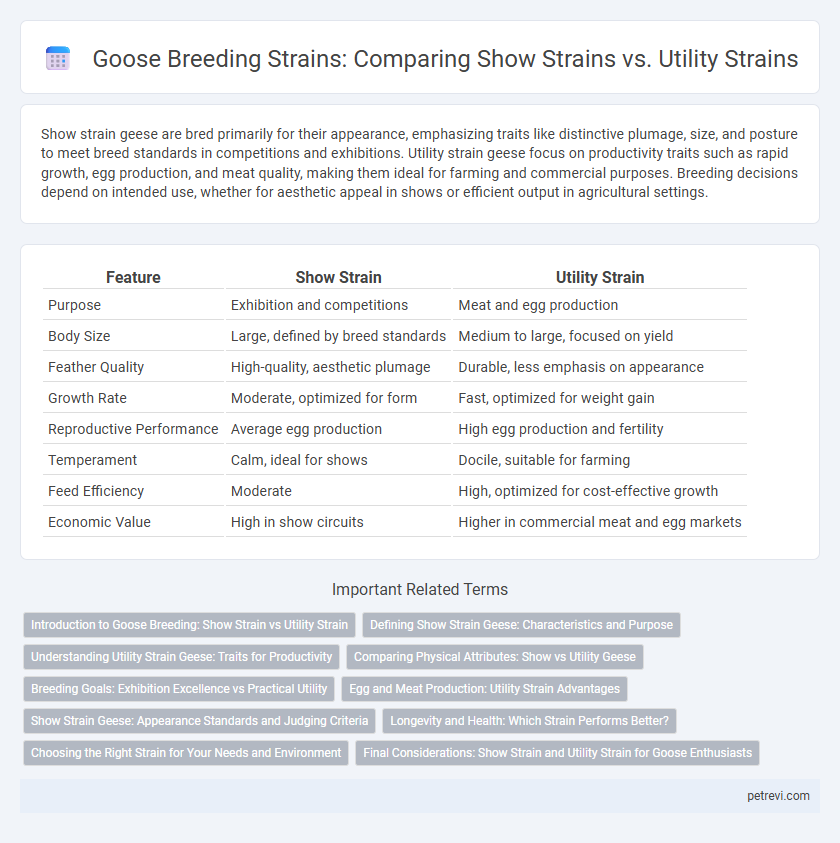Show strain geese are bred primarily for their appearance, emphasizing traits like distinctive plumage, size, and posture to meet breed standards in competitions and exhibitions. Utility strain geese focus on productivity traits such as rapid growth, egg production, and meat quality, making them ideal for farming and commercial purposes. Breeding decisions depend on intended use, whether for aesthetic appeal in shows or efficient output in agricultural settings.
Table of Comparison
| Feature | Show Strain | Utility Strain |
|---|---|---|
| Purpose | Exhibition and competitions | Meat and egg production |
| Body Size | Large, defined by breed standards | Medium to large, focused on yield |
| Feather Quality | High-quality, aesthetic plumage | Durable, less emphasis on appearance |
| Growth Rate | Moderate, optimized for form | Fast, optimized for weight gain |
| Reproductive Performance | Average egg production | High egg production and fertility |
| Temperament | Calm, ideal for shows | Docile, suitable for farming |
| Feed Efficiency | Moderate | High, optimized for cost-effective growth |
| Economic Value | High in show circuits | Higher in commercial meat and egg markets |
Introduction to Goose Breeding: Show Strain vs Utility Strain
Show strains of geese are bred primarily for aesthetic qualities such as plumage, size, and posture, making them ideal for exhibitions and competitions. Utility strains focus on productivity traits like rapid growth, meat quality, and egg-laying capacity, ensuring efficient commercial farming. Selecting between show and utility strains depends on breeding goals, whether prioritizing ornamental appearance or maximizing agricultural yield.
Defining Show Strain Geese: Characteristics and Purpose
Show strain geese are selectively bred for distinctive physical traits such as size, plumage quality, and body conformation to meet breed standards in poultry exhibitions. These geese typically exhibit more pronounced features like upright posture, vibrant feather patterns, and symmetrical body shapes compared to utility strains. Emphasizing aesthetics and breed purity, show strain geese prioritize appearance over productivity metrics such as meat or egg yield.
Understanding Utility Strain Geese: Traits for Productivity
Utility strain geese exhibit traits focused on productivity such as rapid growth, high egg production, and efficient feed conversion rates. These geese are bred for practical purposes like meat and egg production, displaying robust health and adaptability to various farming environments. Show strains, in contrast, prioritize appearance standards, often sacrificing some productivity traits found in utility strains.
Comparing Physical Attributes: Show vs Utility Geese
Show strain geese exhibit pronounced physical traits such as larger body mass, fuller plumage, and symmetrical conformation designed for aesthetic appeal in competitions. Utility strain geese prioritize robust health, efficient feed conversion, and superior meat quality over ornamental features, resulting in leaner bodies with functional morphology. The distinct physical differences influence breeding strategies, with show breeders targeting visual standards and utility breeders optimizing productivity characteristics.
Breeding Goals: Exhibition Excellence vs Practical Utility
Exhibition excellence in Goose breeding emphasizes show strain with a focus on standardized physical traits like plumage, posture, and size, aiming to win competitions and uphold breed standards. Utility strain prioritizes practical traits such as growth rate, egg production, and meat quality, aligning breeding goals with agricultural efficiency and sustainable use. Selecting for exhibition excellence may reduce genetic diversity, whereas utility strain breeding ensures robust, high-yield geese suitable for commercial farming.
Egg and Meat Production: Utility Strain Advantages
Utility strain geese exhibit superior egg production, laying an average of 35-50 eggs per season compared to show strains, which typically produce fewer eggs due to their ornamental breeding focus. In terms of meat yield, utility strains grow faster and develop larger bodies, providing higher meat quantity and better feed conversion rates than show strains. These advantages make utility strain geese ideal for commercial breeders prioritizing efficiency in both egg and meat output.
Show Strain Geese: Appearance Standards and Judging Criteria
Show strain geese are bred for specific conformation traits such as body shape, feather quality, and overall symmetry according to breed standards set by poultry associations. These geese exhibit distinct features like smooth, well-rounded bodies, pristine plumage, and uniform coloration that judges evaluate during competitions. Judging criteria emphasize visual appeal, adherence to breed-specific characteristics, and physical health, making show strain geese ideal for exhibitions rather than utility purposes.
Longevity and Health: Which Strain Performs Better?
Show strains of geese often prioritize aesthetics and breed standards, which can sometimes compromise longevity and overall health due to selective breeding for specific traits. Utility strains, bred primarily for productivity and resilience, generally exhibit stronger health and longer lifespans, making them more suitable for sustainable breeding programs. Data from agricultural studies consistently show utility strains outperform show strains in terms of disease resistance and lifespan, critical factors in maintaining flock vitality over time.
Choosing the Right Strain for Your Needs and Environment
Show strain geese are bred for aesthetic qualities such as plumage, size, and conformation, making them ideal for exhibition and ornamental purposes, while utility strain geese prioritize growth rate, meat quality, and egg production suited for commercial farming or homestead needs. Selecting the right goose strain depends on your primary goals: show breeds excel in appearance and pedigree, whereas utility breeds offer efficiency in food production and adaptability to various environmental conditions. Consider climate, available space, and resource management to ensure optimal health and performance for the chosen strain.
Final Considerations: Show Strain and Utility Strain for Goose Enthusiasts
Show strain geese, known for their striking plumage and ideal body conformation, are favored by enthusiasts who prioritize aesthetics and exhibition standards. Utility strain geese excel in meat production, hardiness, and egg-laying capacity, making them more suited for practical breeding and farm use. Breeders must balance between the ornamental appeal of show strains and the productive traits of utility strains to meet their specific goals in goose breeding.
Show strain vs Utility strain for Goose Breeding Infographic

 petrevi.com
petrevi.com